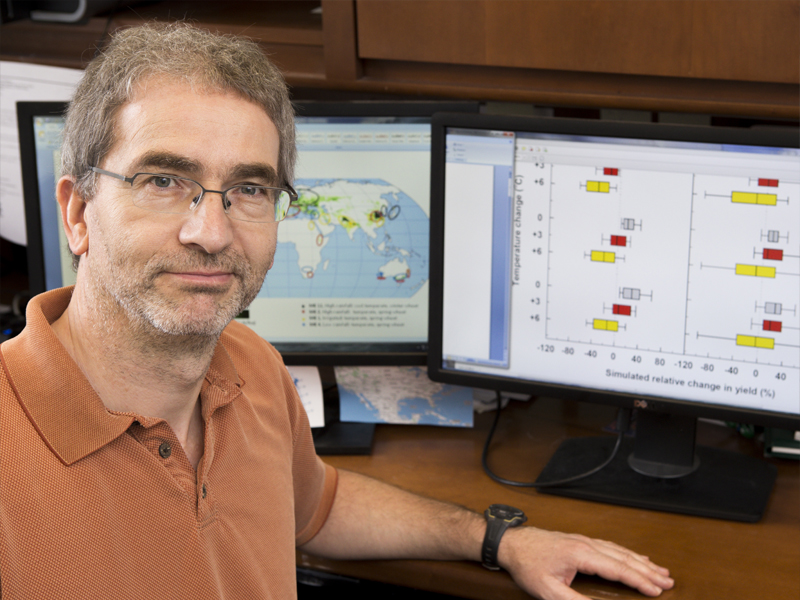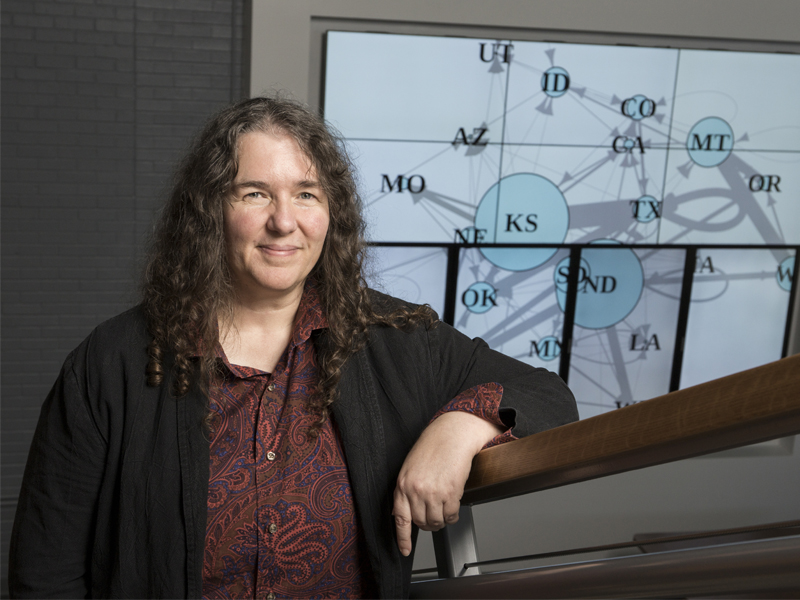Three faculty members with the University of Florida Institute of Food and Agricultural Sciences have been elected 2019 Fellows of the American Association for the Advancement of Science, the world’s largest general scientific society, according to an announcement issued by AAAS earlier today.
The three are: Senthold Asseng, a professor with the department of agricultural and biological engineering; Karen Garrett, a professor with the plant pathology department and Wayne Nicholson, a professor with the department of microbiology and cell science.
The trio will be officially inducted during the AAAS annual meeting Feb. 13-16 in Seattle. They are part of a cohort of six UF faculty elected 2019 Fellows.
Records indicate this is the largest number of UF/IFAS faculty elected AAAS Fellows in a single year, said Jack Payne, UF senior vice president for agriculture and natural resources.
“It’s a wonderful distinction for UF/IFAS, because being elected a Fellow of AAAS is one of the most significant honors that an academic scientist can achieve,” Payne said. “I’m sure I speak for the entire UF/IFAS community when I say ‘congratulations’ and also ‘thank you’ to Drs. Asseng, Garrett and Nicholson, for helping to raise the profile and prestige of UF/IFAS through their accomplishments.”
Senthold Asseng arrived at UF in 2011; he specializes in agricultural systems modeling and concentrates his research on the effects climate change and climate variability may have on global crop production and food security. A longtime co-leader of the international effort known as Agricultural Model Intercomparison and Improvement Project, or AgMIP, Asseng has also served as director of the UF/IFAS-based Florida Climate Institute since April 2019, succeeding founding director Jim Jones, an emeritus professor with the UF/IFAS department of agricultural and biological engineering and himself an AAAS Fellow elected in 2012.

“I’ve always been fascinated by the complexity of agricultural systems, how the life cycle of the crop plant links to the soil and atmospheric conditions,” Asseng said, noting that one reason he chose to work for UF/IFAS was the institution’s established track record for crop modeling. “Jim Jones and Ken Boote were pioneers in this field,” he said.
Visit Asseng’s faculty web page at https://abe.ufl.edu/people/faculty/senthold-asseng/
Karen Garrett, who arrived at UF in 2015, is a noted authority on the practice of modeling epidemics and pathogen and pest movement via systems that distribute seed and harvested crops. Garrett’s studies provide strategies for more effective local and regional management of invasive species, including adaptation to risk under climate change. In addition to her plant pathology position, Garrett is a professor with the UF/IFAS Institute for Sustainable Food Systems.

“It’s exciting to have this recognition for the work of our lab and our collaborative teams at UF and with U.S. partners as well as CGIAR and other international partners,” Garrett said. “We want to contribute to fundamental understanding of epidemiology, and to use that knowledge to address big challenges, especially food security.”
Visit Garrett’s laboratory website at http://www.garrettlab.com
Wayne Nicholson, who has been with UF/IFAS since 2003, has devoted virtually his entire career to the gram-positive bacterium Bacillus subtilis and its biology, to investigate the possibility that microbial life forms can be transferred across space by asteroids or meteors. Nicholson’s studies have demonstrated that B. subtilis is capable of surviving extreme environmental conditions, lending support to the theory that it could withstand space travel and form colonies after arriving at new destinations on rocky objects, a theory known technically as lithopanspermia.

Nicholson commented that, “it’s been a long road and we’ve done a lot of projects.” He noted that his findings have helped demonstrate how rocky debris from Venus, Earth or Mars could have been hurled into space from relatively low-impact meteorite strikes billions of years ago, and that microbes might have been transferred from one planet to another during the early history of our solar system, when environmental conditions on all three planets were fairly similar.
Visit Nicholson’s faculty web page at http://microcell.ufl.edu/people/faculty-directory/nicholson/
Asseng and Garrett, both of whom are based on the UF main campus in Gainesville, were elected to the AAAS Section on Agriculture, Food and Renewable Resources. Nicholson, based at the Florida Space Life Sciences Laboratory on Merritt Island in Brevard County, was named to the AAAS Section on Biological Sciences, as were two UF faculty members with the Florida Museum of Natural History. The sixth 2019 AAAS Fellow with UF hails from the Herbert Wertheim College of Engineering and was named to the AAAS Section on Information, Computing and Communication.
Prospective AAAS Fellows are nominated from the AAAS general membership and elected via a process that is finalized by the AAAS Council, the organization’s member-elected governing body. As of 2018, there were 46 UF faculty named on the AAAS online roster of active members.
 0
0
